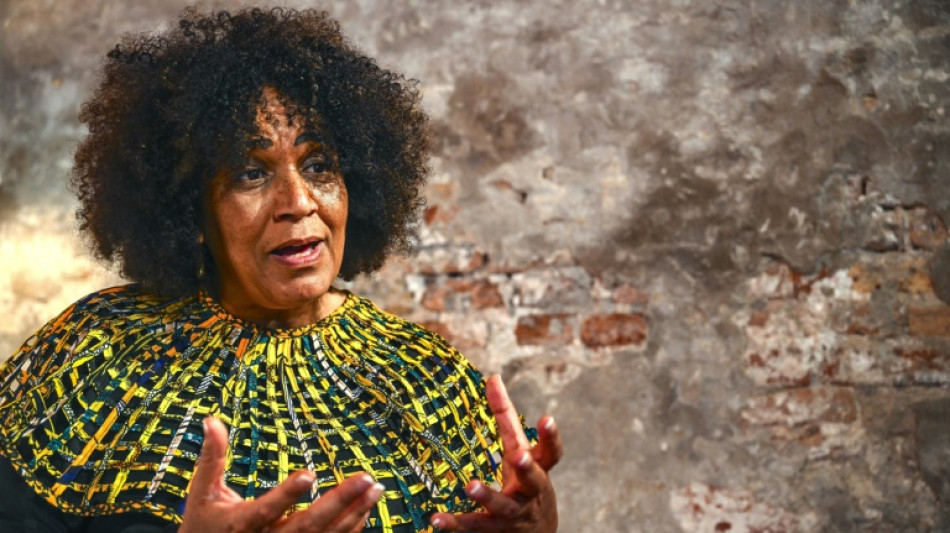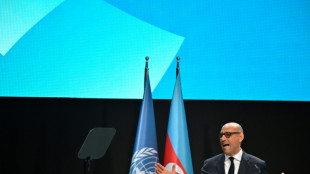
-
 All eyes on G20 for breakthrough as COP29 climate talks stall
All eyes on G20 for breakthrough as COP29 climate talks stall
-
Fritz battles past Zverev to reach ATP Finals title decider

-
 Xi, Biden to meet as Trump return looms
Xi, Biden to meet as Trump return looms
-
Kane warns England must protect team culture under new boss

-
 Italy beat Japan to reach BJK Cup semi-finals
Italy beat Japan to reach BJK Cup semi-finals
-
Farmers target PM Starmer in protest against new UK tax rules

-
 Shiffrin masters Levi slalom for 98th World Cup win
Shiffrin masters Levi slalom for 98th World Cup win
-
Italy's Donnarumma thankful for Mbappe absence in France showdown

-
 McIlroy in three-way tie for Dubai lead
McIlroy in three-way tie for Dubai lead
-
Bagnaia wins Barcelona MotoGP sprint to take season to final race

-
 Ukraine's Zelensky says wants to end war by diplomacy next year
Ukraine's Zelensky says wants to end war by diplomacy next year
-
Shiffrin wins Levi slalom for 98th World Cup victory

-
 Israel pummels south Beirut as Lebanon mulls truce plan
Israel pummels south Beirut as Lebanon mulls truce plan
-
Religious Jews comfort hostages' families in Tel Aviv

-
 German Greens' Robert Habeck to lead bruised party into elections
German Greens' Robert Habeck to lead bruised party into elections
-
Johnson bags five as Australia beat Pakistan to seal T20 series

-
 Zelensky says wants to end war by diplomacy next year
Zelensky says wants to end war by diplomacy next year
-
Rugby Union: Wales v Australia - three talking points

-
 10 newborns killed in India hospital fire
10 newborns killed in India hospital fire
-
Veteran Le Cam leads Vendee Globe as Sorel is first to quit

-
 Bagnaia on pole for Barcelona MotoGP, Martin fourth
Bagnaia on pole for Barcelona MotoGP, Martin fourth
-
UN climate chief urges G20 to spur tense COP29 negotiations

-
 Rauf takes four as Pakistan hold Australia to 147-9 in 2nd T20
Rauf takes four as Pakistan hold Australia to 147-9 in 2nd T20
-
World not listening to us, laments Kenyan climate scientist at COP29

-
 Philippines warns of 'potentially catastrophic' Super Typhoon Man-yi
Philippines warns of 'potentially catastrophic' Super Typhoon Man-yi
-
Wales take on Australia desperate for victory to avoid unwanted record

-
 Tyson beaten by Youtuber Paul in heavyweight return
Tyson beaten by Youtuber Paul in heavyweight return
-
Taylor holds off bloodied Serrano to retain undisputed crown

-
 Japan PM expresses concern to Xi over South China Sea situation
Japan PM expresses concern to Xi over South China Sea situation
-
Tens of thousands flee as Super Typhoon Man-yi nears Philippines

-
 Hoilett gives Canada win in Suriname as Mexico lose to Honduras
Hoilett gives Canada win in Suriname as Mexico lose to Honduras
-
Davis, James spark Lakers over Spurs while Cavs stay perfect

-
 Mushroom houses for Gaza? Arab designers offer home-grown innovations
Mushroom houses for Gaza? Arab designers offer home-grown innovations
-
Gabon votes on new constitution hailed by junta as 'turning point'

-
 Young Libyans gear up for their first ever election
Young Libyans gear up for their first ever election
-
Vice tightens around remaining civilians in eastern Ukraine

-
 Dutch coalition survives political turmoil after minister's resignation
Dutch coalition survives political turmoil after minister's resignation
-
Uruguay end winless run with dramatic late win over Colombia

-
 Max potential: 10 years since a teenage Verstappen wowed in Macau
Max potential: 10 years since a teenage Verstappen wowed in Macau
-
Tens of thousands flee as Typhoon Man-yi nears Philippines

-
 Is Argentina's Milei on brink of leaving Paris climate accord?
Is Argentina's Milei on brink of leaving Paris climate accord?
-
Big Bang: Trump and Musk could redefine US space strategy

-
 Revolution over but more protests than ever in Bangladesh
Revolution over but more protests than ever in Bangladesh
-
Minister resigns but Dutch coalition remains in place

-
 Ireland won 'ugly', says relieved Farrell
Ireland won 'ugly', says relieved Farrell
-
Stirring 'haka' dance disrupts New Zealand's parliament

-
 England's Hull grabs lead over No.1 Korda at LPGA Annika
England's Hull grabs lead over No.1 Korda at LPGA Annika
-
Kosovo players walk off in Romania after 'Serbia' chants, game abandoned

-
 Kosovo players walk off in Romania game after 'Serbia' chants
Kosovo players walk off in Romania game after 'Serbia' chants
-
Lame-duck Biden tries to reassure allies as Trump looms


Venice exhibition shines light on Africa's forced urbanisation
From nomads to deforestation, this year's Venice Architecture Biennale focuses on Africa and the impact of colonisation on the development of a continent undergoing the most rapid urbanisation in the world.
Away from the national pavilions, the main exhibition put together by Biennale curator Lesley Lokko shines a light on the enduring impact of the colonising Europeans who upended traditional ways of life.
Mounir Ayoub, a 40-year-old Tunisian architect based in Geneva, has long been interested in the phenomenon in Tunisia of forced settlement.
Before being colonised by France in 1881, the North African country of his birth "was mostly a country with a nomadic population -- 600,000 nomads and 400,000 sedentary (settled) people", he told AFP.
But through his collection of photos, documents and video testimony from the few remaining nomad families, he argues that France initiated a policy that eventually left the Tunisian desert depopulated.
"The desert was not empty, it was a rich ecosystem with a huge culture. The desert was populated, it was a place of immense civilisation," he told AFP at the exhibition at Venice's former shipyards.
But "France created new cities with oases where water was extracted deep in the desert in order to settle the nomads, to control them, in fact, to start setting up borders", said Ayoub.
The policy continued even after Tunisian independence in 1956, he said, with Tunisian nomads definitively settled by the 1970s and 1980s.
Pointing to places on a map that he said once teemed with life, he lamented that "now there is almost nothing left... even though the whole of Arab civilisation comes from the desert and nomadism".
The end of nomadism was a cultural loss but also an environmental one, as the travelling families had "a minimal impact on the environment", said Ayoub.
The exhibit includes a nomadic tent -- "organic architecture in the first sense of the word: goats, sheep and camels provide hair that is woven into tents".
- No return to 'pure state' -
The number of cities in Africa has doubled since 1990, with their combined population increasing by 500 million people, according to the African Development Bank.
But urban and economic growth has been not only at the expense of Africa's vast deserts but also the continent's forests.
Sammy Baloji, a photographic artist from Lubumbashi, a city in the south of the Democratic Republic of Congo, charted the depletion of his country's rainforests in his project for the exhibition.
He says the process began with Belgium's rule over his country, as part of a colony also including Rwanda and Burundi, when traditional methods of cultivation were abandoned in favour of intensive agriculture.
Baloji said his project, "Debris of History, Issues of Memory", examines "all this human activity from which global warming stems, through the colonisation and devastation of this original vegetation".
The basin of the Congo River is a huge rainforest, second in size only to the Amazon, that absorbs more carbon than it releases -- an environmental benefit threatened by deforestation.
"The question is not to return Africa to its pure state," said Baloji.
"What is interesting is to observe what has been done so far: has it been done taking into account the local populations, their knowledge? Or has it been a devastation of that system to impose another system?"
- Past trauma, future visions -
The exhibition is the brainchild of Lokko, a Ghanaian-Scottish architect who curated this year's Biennale.
She invited 89 participants to contribute to "The Laboratory of the Future", with more than half of them from Africa or the African diaspora.
"We're looking at the more painful aspects of the past, and using that trauma and that vulnerability around questions of identity, migration... which are generally questions architects don't deal with, to inform new visons of the future," Lokko told AFP.
"Our relationship to the environment is a cultural relationship, it's not only a scientific or transactional relationship."
The job of every architect, she said, is "to look at the past in order to project an idea about the future".
J.Fankhauser--BTB
